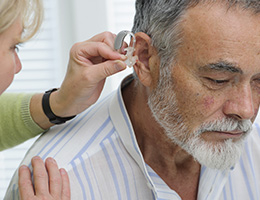
Jan. 23, 2019—Could you have a hearing problem? Many middle-aged and older adults do. And if you're one of them, treating your hearing loss may do more than make your daily life easier. It may help you avoid depression as you get older, a new study suggests.
Hearing loss is one of the most common chronic health conditions in older adults. It affects 2 out of 3 people over 70. And yet many of these people don't know that they have a treatable hearing problem, according to the researchers, whose findings appear in JAMA Otolaryngology–Head & Neck Surgery.
Their study looked at data on 5,328 people 50 and older. All of the people were part of a health study of the Hispanic/Latino community. The researchers found that the more hearing loss people had, the greater their risk for depression.
Compared to those with normal hearing:
- Those with mild hearing loss had nearly twice the risk of depression.
- Those with severe hearing loss had more than four times the risk of depression.
- Although this study focused on Hispanic people, the researchers said the results likely apply to everyone.
Why the connection?
Hearing loss may lead to depression by causing social isolation and loneliness, the study's authors said. When it's hard to communicate, people may become withdrawn.
But the good news? Hearing loss can be diagnosed with a simple hearing test. Consider having your hearing tested if you're middle-aged or older, the study authors advise. If you do have a hearing problem, treating it may help with loneliness, social function and even depression itself, previous research shows.
Depression isn't the only potential consequence of age-related hearing loss, the researchers noted. Other studies have linked hearing problems to dementia.